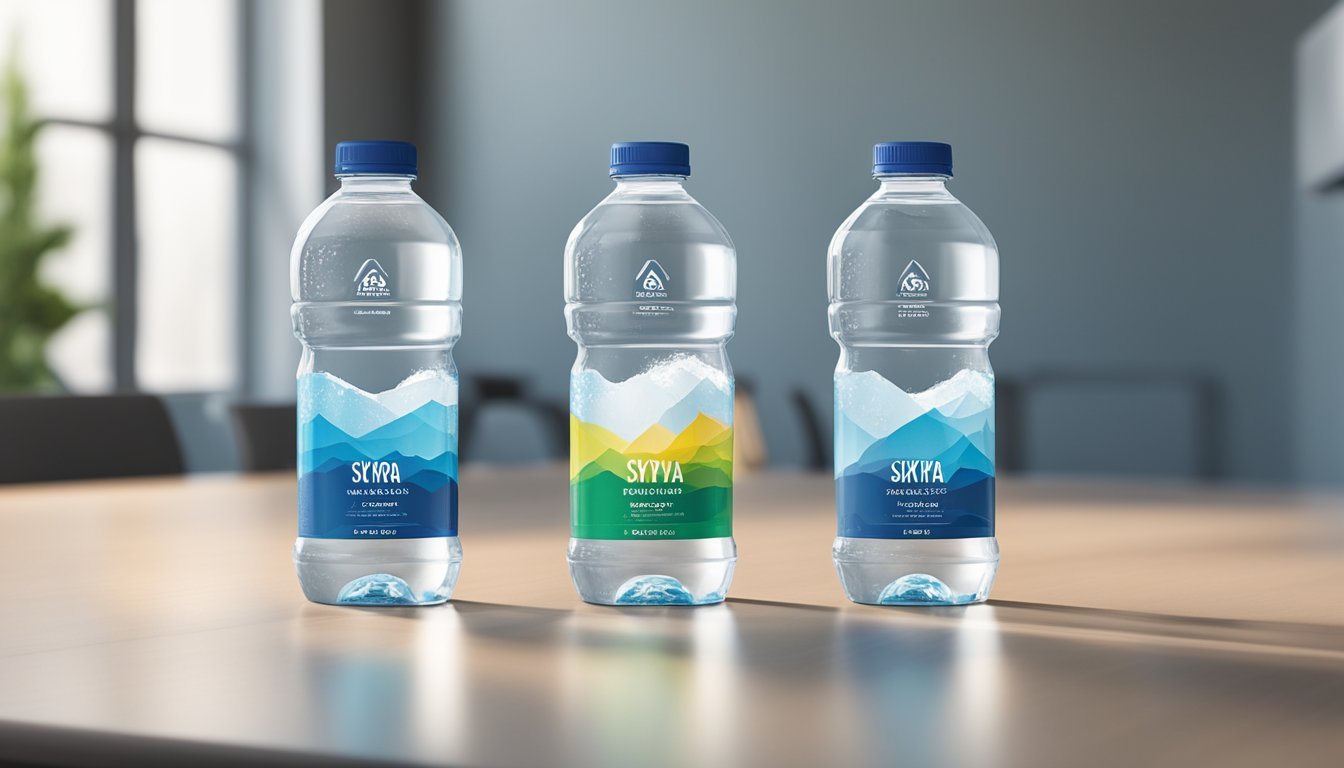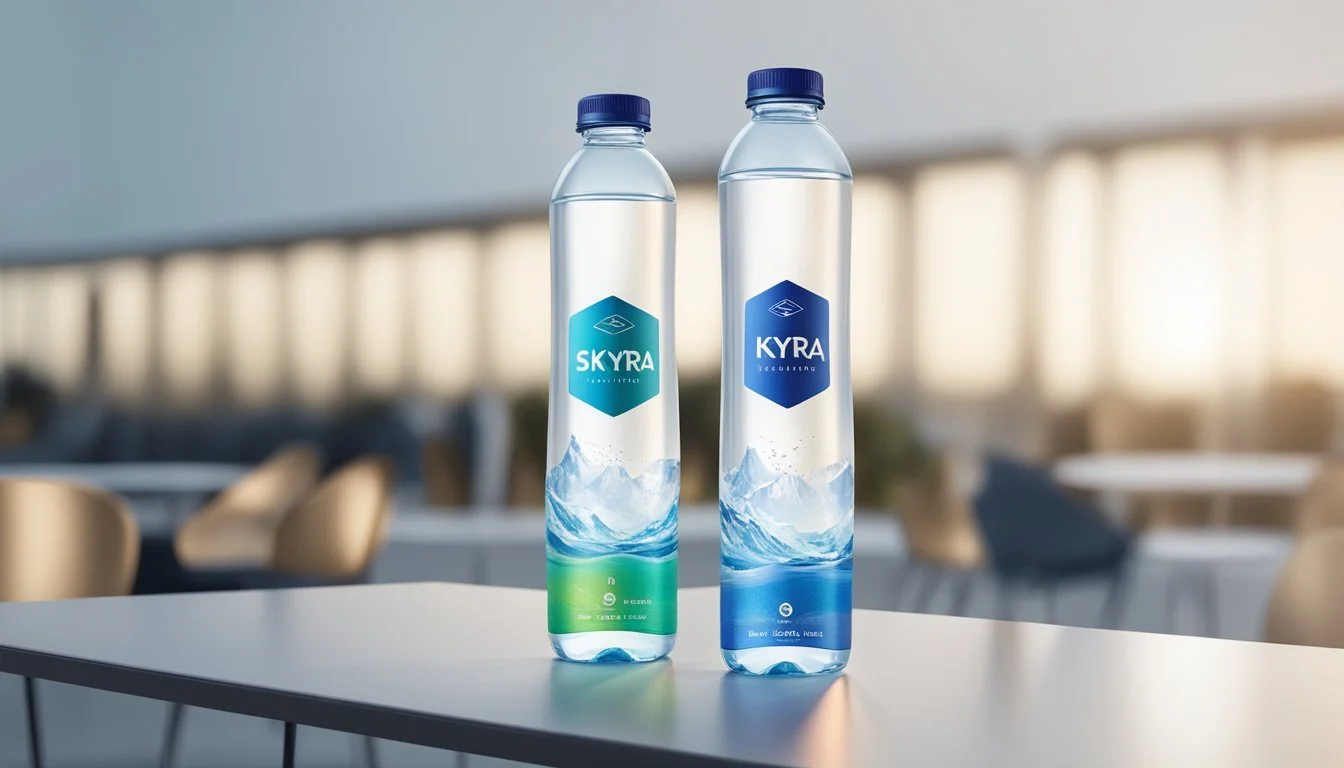Penta vs. Skyra
Which Bottled Water is Better? Comprehensive Comparison
Choosing the right bottled water is crucial for anyone focused on hydration and health. In this comparison, Penta stands out for its ultra-purified water, free from contaminants and boasting a pH that supports optimal hydration. Its proprietary purification process ensures that consumers receive clean and refreshing water.
Skyra, sourced from Icelandic glaciers, offers naturally alkaline water rich in minerals like potassium and magnesium. For those who value mineral content and a unique origin, Skyra provides a distinctly crisp and invigorating taste that appeals to many health-conscious consumers.
When deciding between Penta and Skyra, consider your hydration needs and taste preferences. If purity and neutral pH are your top priorities, Penta is likely the better choice, while those seeking the benefits of naturally occurring minerals might find Skyra more appealing.
Understanding Bottled Water
Bottled water has gained popularity due to its convenience and perceived purity. It is important to compare different types to determine their benefits, especially in terms of source and regulation standards.
Types of Bottled Water
Bottled water comes in various forms, distinguished mainly by their sources and mineral content. Spring water, sourced from natural springs, is known for its natural mineral composition. Mineral water contains minerals like calcium, magnesium, and sodium, often derived from underground sources. Alkaline water has a higher pH level, believed by some to balance acidity in the body. Lastly, purified water undergoes processes like reverse osmosis or distillation to remove impurities. Each type offers unique attributes, making the choice dependent on individual preferences and health considerations.
Bottled Water Regulation Standards
Regulation standards for bottled water ensure safety and quality. In the United States, the FDA regulates bottled water as a food product, while the EPA oversees tap water. The FDA's regulations involve strict guidelines for water source protection, processing, and labeling. Bottled water must meet specific standards for microbiological, physical, chemical, and radiological properties. Producers are required to use protected sources and implement treatment processes to eliminate contaminants. Additionally, the mineral content must be accurately depicted on labels. Compliance with these standards guarantees that consumers receive safe and properly labeled products.
Comparing Water Sources and Purity
This article examines the differences in water sources and purity between Penta and Skyra bottled water brands. We will discuss the origins of their water and the filtration processes each company uses to ensure the highest quality.
Penta's Water Source
Penta Water is sourced from a natural aquifer in Southern California. The company focuses on obtaining water from a deep and well-protected underground source, which helps minimize potential contamination. Penta emphasizes that their water is free from heavy metals and other contaminants, which is particularly important for those concerned about water purity. Their water is sourced from a location renowned for its pristine natural conditions, making it appealing for health-conscious consumers.
Skyra's Water Source
Skyra water is sourced from Icelandic springs. The water is naturally filtered through layers of basalt and lava rock, which gives it a unique mineral composition. Skyra markets its product as pristinely natural, emphasizing the self-replenishing nature of their source. The origin in Iceland, known for its clean environment, adds to the perception of purity and natural quality. Skyra's water has a naturally high pH of 8.88, which some believe can offer health benefits.
Purity and Filtration Processes
Penta employs a multi-step filtration process to ensure their water is exceptionally pure, devoid of any impurities. This advanced filtration process includes reverse osmosis and microfiltration, ensuring no contaminants, including heavy metals, remain. Their approach is scientific and rigorous, aiming to provide water that is as pure as possible.
Skyra relies on natural filtration provided by the basalt and lava rocks through which the water flows. This natural filtering process, combined with minimal human intervention, ensures that Skyra water retains its mineral content naturally. No additional chemicals are used in their filtration process, adhering to their philosophy of keeping the water as close to its natural state as possible.
By highlighting the inherent qualities and careful processing methods of Penta and Skyra, consumers can make informed decisions based on what matters most to them: natural purity or advanced filtration techniques.
Taste and PH Balance
When comparing Penta and Skyra bottled water, it's important to look at factors like taste and pH balance. These elements can influence both the drinking experience and potential health benefits.
Factors Influencing Taste
The taste of bottled water is influenced by various elements, including mineral content and the pH level. Penta water goes through a unique purification process that removes impurities, resulting in a clean and crisp taste. Skyra, sourced from Icelandic glacial springs, offers a smooth taste facilitated by its natural filtration process.
Penta's proprietary purification can lead to a distinct, neutral flavor that some may find more appealing. In contrast, Skyra’s slight mineral presence provides a taste profile that feels more robust and satisfying for others.
PH Levels and Health
The pH level of water can range from acidic to alkaline, affecting both taste and health attributes. Tap water usually has a pH between 6.5 to 9.5, but bottled options vary. Penta water typically maintains a near-neutral pH around 7, making it neither too acidic nor too alkaline.
Skyra water's pH ranges from 7.2 to 7.4. This slight alkalinity can be beneficial for neutralizing bodily acids, potentially aiding in pH balance. While both waters are close to neutral, Skyra's higher pH might offer additional health benefits, especially for those looking to counteract acidic diets or conditions.
The balance of acidity and alkalinity in these waters can contribute to hydration efficiency and overall bodily functions, making the choice personal depending on one's health needs and taste preference.
Nutritional Content
Penta and Skyra bottled waters offer distinct nutritional profiles that cater to specific health needs. Key aspects such as essential minerals and electrolytes, and their impact on hydration and health, are critical for consumers.
Essential Minerals and Electrolytes
Essential minerals like calcium, magnesium, and potassium play crucial roles in overall health. Skyra water is sourced from Iceland and contains these minerals, providing natural benefits.
Calcium: Skyra includes calcium which is crucial for bone health.
Magnesium: Both waters have magnesium, supporting muscle and nerve function.
Potassium: Skyra contains potassium, aiding in fluid balance and muscle health.
Penta, in contrast, emphasizes purity with fewer dissolved solids and lower mineral content. This may suit individuals preferring less mineralized water for strictly hydration purposes without additional nutrient intake.
Impact on Hydration and Health
Skyra's mineral content, including electrolytes, enhances hydration benefits. Electrolytes help maintain fluid balance, which is key during physical activities.
Hydration Benefits: Skyra's natural electrolytes can improve water retention and hydration efficiency.
Health: Regular consumption can contribute to daily nutrient intake, supporting overall wellness.
Penta focuses on ultra-purified water, free from contaminants and almost devoid of minerals. Some users might prefer this for a cleaner, lighter taste, and minimal impact on kidneys or other systems processing minerals.
Choosing between Penta and Skyra depends on whether one values additional nutrients or prefers ultra-pure hydration.
Environmental Impact
When comparing the environmental impact of Penta and Skyra bottled water, key considerations include the types of packaging used and the carbon emissions generated during production and transportation.
Packaging and Plastic Waste
Penta water is packaged in BPA-free plastic bottles, which while safer for consumers, still contribute to plastic waste. Plastic bottles are notorious for their long decomposition time, adding to environmental pollution. Skyra stands out by using glass bottles, which are more eco-friendly as glass can be recycled infinitely without losing quality.
However, the availability and convenience of recycling facilities can impact the overall effectiveness of these eco-friendly measures. Consumers in areas with robust recycling programs may find glass bottles more advantageous. On the other hand, plastic bottles, despite being less environmentally friendly, offer lightweight and shatterproof alternatives which some consumers may prefer for convenience.
Carbon Footprint of Bottled Water
The carbon footprint of bottled water production and transportation is a significant factor. Penta uses plastic bottles, which generally have a lower initial carbon footprint compared to glass but contribute more to ongoing environmental degradation due to their persistence in the environment. Skyra’s use of glass bottles results in higher upfront carbon emissions due to the energy-intensive production process.
Transportation also plays a role. Glass bottles are heavier, resulting in higher fuel consumption and carbon emissions during shipping. Penta’s lighter plastic bottles reduce shipping weight and related emissions, offering a slight advantage in this respect.
Both brands face challenges in their quest to minimize environmental impact, but their differing approaches cater to varying consumer priorities regarding sustainability and convenience.
Brand Reputation and Practices
When comparing the reputation and practices of Penta and Skyra, it's essential to consider their company histories, water sourcing methods, marketing strategies, and customer trust, including safety concerns. This comparison reveals their approach to maintaining quality and safety in the competitive bottled water market.
Company Histories and Water Sourcing
Penta's parent company, Penta Water, emphasizes ultra-purification through a patented 13-step purification process. Penta Water ensures their water is free from chemicals and contaminants, sourcing from carefully monitored underground aquifers.
Skyra, on the other hand, sources its water from Icelandic springs, known for their purity and mineral content. Skyra's water undergoes minimal processing to maintain its natural properties. Both brands pride themselves on high-quality sourcing but differ significantly in their purification and processing methods.
Marketing Strategies
Penta markets itself as a premium, health-focused brand, highlighting its extensive purification process and the resulting cleanliness of its water. The company leverages health-conscious consumers by promoting the benefits of ultra-purified water.
Skyra focuses on the purity and natural mineral content of its Icelandic spring water. The brand uses its geographical origin as a key selling point, appealing to those who value natural products with minimal processing. Their marketing stresses the pristine nature of Iceland’s water sources.
Customer Trust and Safety Concerns
Safety and customer trust are paramount for both brands. Penta emphasizes its meticulous purification process to assure customers of safety and quality, avoiding common contaminants like pesticides and heavy metals. Independent lab tests support their claims of purity.
Skyra builds trust by maintaining transparency about its sourcing and processing. Their water is naturally filtered and rich in minerals, with rigorous quality checks in place. The brand’s commitment to natural purity helps assure customers of safety without the need for extensive processing.
Both Penta and Skyra cater to different aspects of consumer preferences, whether it’s ultra-purification or natural purity, but each meets high safety standards in their own way.
Consumer Preferences and Trends
Understanding consumer preferences and emerging trends in the bottled water market reveals what drives individuals to choose one brand over another. Key factors include taste, hydration needs, and perceived quality.
Emerging Trends in Bottled Water Consumption
Consumers are increasingly seeking high-quality water with unique characteristics. Brands like Penta and Skyra are capitalizing on this by emphasizing purity and mineral content.
There is a notable shift towards water with added benefits, such as electrolytes for better hydration. People's purchasing decisions are also influenced by sustainability practices of bottled water companies.
In a recent taste test, different brands were ranked based on purity and overall taste. Penta and Skyra consistently perform well in these tests, catering to consumers who prioritize taste and quality over cost.
Importance of Personal Choice
Personal preference plays a crucial role in the selection of bottled water. Factors such as taste, brand loyalty, and individual hydration needs significantly impact consumer choices.
For example, some individuals prefer Penta for its ultra-pure water, which is achieved through a patented purification process. Others may opt for Skyra, valuing its unique volcanic origin and mineral composition.
Consumer advocacy and availability of options allow individuals to find the best bottled water that meets their specific needs. Brands that can clearly communicate their benefits and cater to diverse preferences are likely to succeed in this competitive market.
Conclusion
When comparing Penta and Skyra, both brands offer unique features appealing to different consumer preferences.
Penta emphasizes purity and advanced filtration. It undergoes a 13-step purification process, making it extremely clean. This appeals to consumers who prioritize the absence of contaminants in their water.
Skyra, on the other hand, stands out for its naturally occurring minerals sourced from Icelandic springs. This natural mineral content may enhance hydration and provide additional health benefits, such as essential electrolytes.
Hydration is a key factor. While both brands efficiently hydrate, Skyra’s mineral content could offer an edge in electrolyte replenishment during intensive activities.
Consumers deciding between these brands should consider their priorities. If ultra-pure, contaminant-free water is the goal, Penta may be preferable. For those seeking water with natural minerals and a taste reflecting its source, Skyra might be the better choice.
In terms of availability, both brands are widely distributed but checking local availability could influence the decision.
Ultimately, Penta and Skyra each bring valuable attributes to clean drinking water, making either a respectable choice for daily hydration.
More About Penta
Mountain Valley Spring Water vs Penta: Which Bottled Water is Better?
Penta vs Richard's Rainwater: Which Bottled Water is Better?
Penta vs Whole Foods Italian Still Mineral water: Which Bottled Water is Better?






